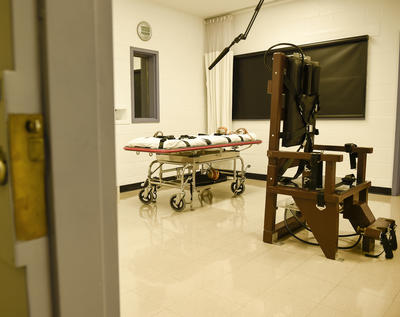
Options are running out for a man on Tennessee’s death row who is scheduled for execution next week. A judge has twice denied Oscar Smith’s last-minute request to reopen his case, because of new DNA evidence.
Smith’s attorneys can still appeal, and they plan to ask the state Supreme Court to pause his execution in the meantime. But if the state does put him to death, they don’t want it to be by lethal injection.
Lethal injection is the default method for execution in Tennessee. People sentenced to death for crimes committed before 1999 can also choose the electric chair. Several have in recent years, because they feared the state’s drugs would cause even more pain.
Smith’s attorneys think Tennessee’s lethal injection protocols amount to cruel and unusual punishment, which would violate their client’s constitutional rights. But he doesn’t want to choose the electric chair, either. Instead, they have identified an alternative: firing squad.
“Death from firing squad is virtually instantaneous, occurring in under two seconds,” the attorneys wrote in a complaint filed last month in Chancery Court. “The firing squad significantly reduces a substantial risk of unnecessary and severe pain when compared with the midazolam-based three-drug lethal injection protocol.”
The filing references a study of executions between 1900 and 2010, which found that more than 7% of lethal injection executions went wrong, as did about 2% of electrocutions, while none of the 34 by firing squad were “botched.” Last fall, the AP reports, John Marion Grant convulsed and vomited during a lethal injection in Oklahoma that lasted about 20 minutes.
Smith’s attorneys note that South Carolina just built its own firing squad chamber, for about $50,000. They say it’s a feasible option that would be quicker and cause less suffering. Past case law has required those who challenge the state’s lethal injection protocols to offer another method they believe is constitutional.
The Tennessee Department of Correction has said in the past that execution by firing squad would be too expensive and would cost more than $1.5 million. TDOC did not immediately respond to a request for comment.
If the court sides with Smith but the department can’t prepare a firing squad in time, he could be executed by electrocution.
Questions about DNA
Smith was sentenced to death in 1990 for murdering his estranged wife, Judith Lynn Smith, and her sons from another marriage, Chad and Jason Burnett. Court records show he had allegedly threatened to kill them before, and that warrants were already out for his arrest for another alleged attack.
Smith’s attorneys filed a motion last week urging the courts to review his case, because a new forensic analysis found another person’s DNA on one of the weapons allegedly used in the killing. They believe that finding could either clear their client of wrongdoing, or at least show that the state contaminated the evidence somehow — both of which could cast doubt on his conviction.
“The law provides that the court should order a hearing if the new DNA evidence would have resulted in a more favorable verdict or sentence,” his attorneys said in a statement. “In this case, one of the jurors has said that they would not have given the death penalty had they known of the DNA evidence.”
A judge denied their request on Monday. She again denied their motion to reconsider Tuesday.
Next, the case could go to the criminal court of appeals. Smith’s defense team declined to comment on other legal actions they may take.

